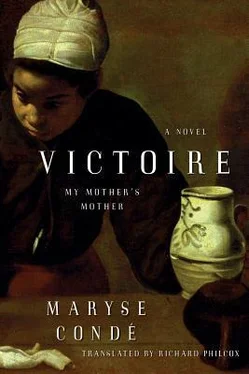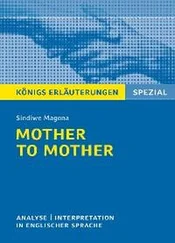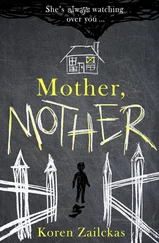Mother, do you remember
Your child who loves you
And cannot tell you?
Mother,
Take my hand, my little hand
So that
It will warm your poor heart.
Even her colleagues who were used to making scathing, disparaging comments began to pity her. Some of them claimed that she could not cherish her mother to such a degree and be without a heart.
“A sham!” cried the most hard-core of them. “She’s playacting.”
Once again, passionate discussions broke out in the shade of the mango trees in the recreation yard about Jeanne Boucolon.
Soon, Victoire was too weak to walk to the Place de la Victoire and Anne-Marie, breaking with habit, had to come to the rue de Condé. Every day she would turn up with her viola, flute, bass guitar, records, and mint candies, fanning herself energetically since, owing to her weight, she was always too hot. Jeanne had trouble putting up with these visits. She was probably jealous. We know that deep down she had always been jealous of all those who were close to her mother: Boniface, Jeanne Repentir, Valérie-Anne, Jérémie Cabriou, and Anne-Marie — especially Anne-Marie, who had stolen Victoire from her since childhood. Now that Jeanne would have liked to be alone with her mother, to finally strike up that difficult dialogue which had all too often been interrupted, Anne-Marie increasingly managed to capture Victoire’s attention and force out of her one of those rare, secretive smiles. What could she be telling her? Jeanne wondered, mortified. Nothing very interesting, that’s for sure: the latest escapades of Boniface Jr.; of Valérie-Anne’s difficult pregnancy. Since Jeanne had no friends, she did not know that friendship is largely based on just that: shared trivialities.
Jeanne, however, thought that Anne-Marie was judging her, blaming her, and bad-mouthing her. This was true in the past. Now Anne-Marie was too affected by the condition of her alter ego and preoccupied by other concerns. Seeing Victoire leave meant losing whole chapters of her own life. It was as if she too were leaving. She had never experienced anything like it since the death of Etienne.
One afternoon, Anne-Marie appeared at the rue de Condé followed by a servant carrying a heavy box of gospel and blues records, a music that was little known in Guadeloupe at the time and had its origins among the blacks from the Deep South. Jeanne, who was as a rule so impervious to any sort of music and anything that was not French from France, became fascinated by these harmonies from elsewhere. For her they seemed to well up from her own suffering, from deep inside her. I often heard my mother hum: Sometimes I feel like a motherless child .
Victoire died at the end of June 1915.
According to legend maintained by Jeanne, before passing away Victoire took the hands of Jeanne and Auguste, who were standing next to each other at her bedside, and murmured:
“Sé douvan zot kale a pwezan. Mwen pé pati.” (You go on. I can leave now.)
These prophetic words that seem to come straight out of the manual The Last Words of Honest Souls are quite improbable. Crammed with morphine, for the cancer had spread to her bones and she suffered agonies, Victoire probably slipped into the other world without saying a word, without revealing anything about herself, the same way she had lived her life.
Jeanne’s grief was without bounds. Even her children’s kisses could not console her. Not even God Himself, at whose feet she lost herself in prayer day after day. As the modern saying goes, she never got over it. Her grief went even deeper, owing to the conviction that she hadn’t been loved because she had been a bad daughter, who had brutalized Victoire and had not been able to tell her everything she meant to her.
But isn’t this the risk we all run when we think of our deceased mothers?
She held it against Auguste for accepting Victoire’s death with relative indifference and above all for not helping her build a mausoleum in memory of the deceased. I have already said that it was always most reluctantly that he spoke of her. Apart from the times when he gave himself an imaginary set of parents, he never mentioned anyone. It was quite by chance I learned that his mother, Célanire Pinceau, died accidentally, burned alive when her shack made of old soap boxes went up in flames while he was out playing football near the hospital. As a result, the colonial authorities put him into care and enrolled him in the Lycée Carnot’s boarding school. His guardian was a mulatto notary, a fervent churchgoer, to whom his mother had hired her services. I think I am unfair to my father. Too much suffering during his teenage years had stunted his feelings.
In her grief and her remorse, Jeanne constructed a myth that barely corresponded to reality and left in the dark uncertain aspects of Victoire’s personality. In short, she endeavored at all costs to have her conform to the clichéd norm of the Guadeloupean matador, the fighting woman who courageously resists life’s trials. As for me, I prefer my grandmother to remain secretive, enigmatic, the improper architect of a liberation that we, her descendants, have known how to enjoy to the full.
TWO WEEKS AFTER the death of Victoire, amid the popular rejoicing of a July 14 Bastille Day, Jeanne gave birth to a baby girl, who from the very cradle was lovely and melancholic, as if the sorrows of the mother had been passed on to her: my sister, Ena.
* From Eloges and Other Poems , translated by Louise Varèse. New York: Pantheon Books, 1956.












